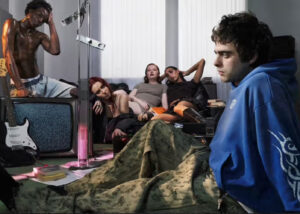On April 16, 2025, The Stolen Girl makes its highly anticipated premiere on Disney+, bringing a sharp, emotionally charged psychological thriller to audiences worldwide. In the U.S., episodes will roll out weekly on Freeform at 10:00 PM ET, followed by next-day streaming on Hulu. The show adapts Alex Dahl’s bestselling novel Playdate, channeling its tense atmosphere and emotional stakes into a five-part limited series.
The Stolen Girl is not just another missing child drama. Instead, it delivers a methodical and piercing look at the fissures within family, the complexity of trauma, and the tangled web of secrets people keep. Over five meticulously crafted episodes, viewers are taken on a harrowing journey through the eyes of a mother whose life shatters overnight—and the strangers whose own scars drive them to extreme actions.
Plot Overview
The Stolen Girl opens with the ordinary: Elisa Blix (Denise Gough), a successful professional and devoted mother, is juggling the logistics of family life. Her two children—nine-year-old Lucia and her older sibling—are her world. The family has recently relocated, adjusting to a new city, new routines, and new faces. Elisa, still carrying the weight of her own unsettled past, is keen to fit in, to ensure her children feel secure and at home.
When Lucia makes a new friend, Josie, at school, Elisa sees an opportunity for her daughter to belong. Josie’s mother, Rebecca (Holliday Grainger), seems warm and engaging, her home immaculate and inviting. After a brief chat at pickup, Rebecca invites Lucia for a sleepover. Elisa, initially cautious, allows her daughter to go, reassured by Rebecca’s poise and the apparent normalcy of the setting.
But the next morning brings terror. Elisa arrives to collect Lucia—only to find the house is empty. The family who lived there are gone, the furniture stripped, the space cold and echoing. A stunned neighbor reveals the home was a short-term holiday rental. Rebecca and Josie have vanished, taking Lucia with them. Panic gives way to horror as Elisa and her husband Fred (Jim Sturgess) realize the scale of what’s happened: their daughter has been abducted by strangers hiding behind borrowed names and an elaborate facade.
As the police are called and a manhunt launches, Elisa and Fred’s private anguish is made brutally public. Investigators dig into every aspect of their lives, exposing fractures beneath the family’s polished surface. Neighbors, friends, and the media circle, each with their own theories, suspicions, and judgments.
What follows is a desperate race across countries and time zones, with Elisa at the center, battling grief, fear, and growing doubt. As days drag on with no word, each character’s secrets start to surface. Why did Rebecca take Lucia? What is her real identity—and what has driven her to such lengths? Is Lucia in danger, or is something more complicated at play?
The show’s momentum builds episode by episode, weaving together multiple perspectives—Elisa’s, Rebecca’s, and those around them. By its final hour, The Stolen Girl has transformed from a missing-person story into a searing meditation on parenthood, survival, and the cost of hidden truths.
Main Cast and Characters
Denise Gough as Elisa Blix
Elisa anchors the story as the mother whose child disappears. Gough brings grit and vulnerability to the role, portraying Elisa as both deeply loving and deeply flawed. As suspicion from police and the public mounts, Elisa must confront her own past—the choices she’s made as a mother, and the mistakes she desperately wants to hide. Her journey is one of resilience, but also of reckoning: as the search for Lucia widens, so does the scrutiny of her own life.
Holliday Grainger as Rebecca Walsh / Nina
Rebecca, whose real name is revealed as Nina, is the woman at the heart of the abduction. Grainger plays her with complexity, alternating between calculated confidence and palpable pain. Over the course of the series, Nina’s motivations are gradually uncovered, painting a portrait not of a simple villain, but of a woman shaped by trauma, clinging to her daughter, and convinced she has no other way out. As Grainger has stated, “Nina is not out for revenge—she’s out for her own survival.” The character’s backstory is a slow-burn revelation that underpins the entire series.
Jim Sturgess as Fred Blix
Fred is Elisa’s husband, a man who seems steady but whose own secrets begin to erode trust within the family. As the investigation wears on, Fred’s past and present choices become central to both the police inquiry and the media’s feeding frenzy. Sturgess balances Fred’s desperation with ambiguity, never letting viewers fully trust or condemn him until the truth comes out.
Ambika Mod as Selma Desai
Selma is an investigative journalist who covers the case. Ambitious and persistent, she brings a different lens to the story, digging into the official narrative and often uncovering leads missed by the police. As she becomes more involved, Selma’s own ethics are tested. Her editor, Kaleb, urges her to tread carefully—aware that one misstep could destroy reputations, or even derail the search for Lucia.
Bronagh Waugh as DI Shona Sinclair
Detective Inspector Sinclair heads the investigation. Determined and sharp, she’s both a comfort and a threat to Elisa, sympathetic to the family’s pain but unflinching in pursuit of the truth. Waugh’s performance grounds the police procedural elements of the show, adding realism and emotional weight.
Michael Workeye as Kaleb Negasi
Kaleb, Selma’s editor, provides an external perspective on the chaos swirling around the Blix family. He pushes for hard facts over conjecture, serving as a conscience and a counterpoint to Selma’s relentless drive.
Beatrice Cohen as Lucia Blix
Lucia, though absent for much of the series, remains at its heart. Flashbacks and glimpses of her time with Rebecca/Nina offer insight into her spirit, fears, and hopes. Beatrice Cohen gives Lucia a presence that lingers, heightening the stakes of every decision and revelation.
Robyn Betteridge as Josie Thibault
Josie, Rebecca’s daughter, is both companion and co-conspirator in the unfolding events. Her bond with Lucia becomes a focal point, raising questions about complicity, innocence, and the blurred lines between victim and perpetrator.
Production Details
The Stolen Girl is helmed by director Eva Husson, known for Mothering Sunday, and scripted by Catherine Moulton, whose previous work includes the acclaimed drama Baptiste. The show is a joint effort from Quay Street Productions (an arm of ITV Studios) and Brightstar. Executive producers include Nicola Shindler, Tanya Seghatchian, John Woodward, Alex Dahl, Eva Husson, and Catherine Moulton, with James Dean as producer.
Filming began in Manchester in June 2023, making full use of the city’s brooding urban landscapes. Select sequences were shot in France, adding a cross-border element to the search for Lucia and underscoring the series’ international scope.
Every technical aspect—from the sharp cinematography to the haunting score—works in service of the story’s tense, emotional core. The pacing is tight, the editing unflinching, and the visuals often veer into the starkly realistic, refusing to glamorize the pain at the story’s center.
Detailed Episode Guide
Episode 1
The opener sets the stage with efficiency and dread. Viewers are introduced to the Blix family’s seemingly stable life. Lucia’s invitation to a sleepover at Josie’s is both mundane and monumental—a decision Elisa agonizes over but ultimately agrees to. The episode spends time on the little details: Elisa’s hesitance, Rebecca’s warmth, the nervous energy of the kids. The next morning, when Lucia is missing, the show’s pace accelerates, plunging viewers into Elisa’s panic and disbelief. The police arrive, questions are asked, and the first cracks in the Blix family’s story begin to show.
Episode 2
The investigation broadens. A mysterious letter arrives, hinting that Lucia is alive and suggesting motives beyond simple malice. Detective Sinclair ramps up the inquiry, questioning Fred’s behavior and forcing Elisa to re-examine everything she thought she knew. The episode is heavy on procedural beats—interviews, forensic searches, media coverage—while also deepening the emotional rift between Elisa and Fred.
Episode 3
Journalist Selma Desai takes center stage, digging into the Blix family’s history and finding contradictions. Flashbacks to Rebecca/Nina’s life fill in blanks, offering a glimpse of her own childhood trauma and hinting at why she might target Lucia. The show resists easy answers, keeping viewers guessing about who is manipulating whom. As Selma’s investigation heats up, she uncovers a secret about Elisa—something that could alter public perception and the direction of the case.
Episode 4
Social media speculation explodes. Elisa is harassed online, accused of complicity, and her every move is scrutinized. The pressure pushes her to revisit an old secret—a decision she made years ago that may be the key to understanding why Lucia was taken. The episode also follows Rebecca/Nina and the girls on the run, blurring the line between abductor and protector. Tension mounts as the search narrows and mistakes threaten to expose everyone.
Episode 5
The finale is a race against time. All parties—Elisa, Fred, Selma, the police—converge as clues point toward Rebecca/Nina’s hideout. Secrets spill in rapid succession: the truth about Fred, the extent of Elisa’s guilt, Rebecca/Nina’s real motivations, and the fate of Lucia and Josie. The show’s conclusion is both cathartic and open-ended, forcing viewers to confront their own assumptions about blame, forgiveness, and what it means to be a parent.
Themes: Motherhood, Trauma, and Moral Ambiguity
At its core, The Stolen Girl is a story about the primal bond between parent and child. But it doesn’t romanticize motherhood or fatherhood; instead, it probes the darker corners—fear, resentment, guilt, and the sacrifices parents make, both noble and catastrophic.
Rebecca/Nina’s abduction of Lucia is painted not as an act of evil, but as the culmination of a life marked by loss and desperation. Her backstory unfolds in fragments, revealing a woman who has been failed by the systems and people meant to protect her. Her actions force the audience to consider: can abduction ever be an act of protection? Can the law account for the damage done by trauma, or the ways it shapes morality?
Elisa, meanwhile, is no paragon. Her mistakes are not just in the past—they ripple through the present, complicating the search for Lucia and driving wedges within her marriage and community. The show uses public suspicion and media scrutiny to comment on society’s tendency to blame mothers for everything that goes wrong, from missing children to broken families.
The police and media are not portrayed as monolithic villains or heroes. Detective Sinclair’s empathy coexists with professional detachment, and Selma’s reporting walks the line between truth and exploitation. The show constantly asks: who has the right to judge, and who benefits from each revelation?
Reception and Cultural Context
Early reviews for The Stolen Girl have praised its unflinching writing, nuanced performances, and refusal to provide easy answers. Holliday Grainger’s turn as Rebecca/Nina stands out for its psychological subtlety—she plays a character who is both deeply damaged and fiercely resourceful. Denise Gough’s portrayal of Elisa is equally lauded, with critics noting her ability to oscillate between steely resolve and raw vulnerability.
Critics have highlighted the series’ willingness to wade into uncomfortable territory—questioning the institutions meant to safeguard families, exposing the voyeurism of media coverage, and challenging the neat binaries of victim and villain. In a cultural moment obsessed with true crime and the private pain of others, The Stolen Girl refuses to exploit its subject matter, opting instead for honest, sometimes painful complexity.
Audiences have responded strongly to the show’s emotional intensity and its thought-provoking approach to topical issues: child safety, online harassment, and the hidden traumas that shape ordinary lives. As conversations swirl online, some viewers debate Rebecca/Nina’s culpability, while others sympathize with her motives. The show’s refusal to give a single “answer” has become one of its biggest strengths.
The Trailer: Setting the Tone
The official trailer for The Stolen Girl pulls no punches. In under two minutes, it sets a mood of rising panic and aching loss. Shots of Elisa’s frantic search, the emptiness of Lucia’s abandoned bedroom, and the cold calculation in Rebecca/Nina’s eyes combine to create an atmosphere of dread. The music pulses with urgency, each note echoing the ticking clock.
Flashbacks and close-ups build empathy for all involved, signaling to viewers that this is not just a procedural, but a story about real, complicated people. The trailer’s final moments—a glimpse of Lucia clutching Josie’s hand as they disappear into the night—underline what’s at stake. For Elisa, and for every parent watching, the nightmare is all too easy to imagine.
Impression
The Stolen Girl is a standout entry in the modern thriller genre, offering more than suspense or spectacle. With its layered characters, sophisticated writing, and refusal to tie up every thread, it challenges audiences to grapple with ambiguity—and to question what they would do if faced with impossible choices.
On the surface, it’s a story about a missing child. But underneath, it’s about what it means to protect the people you love, the ways trauma reverberates through generations, and the high cost of truth. In a media landscape full of formulaic mysteries, The Stolen Girl stands out for its courage and craft.
No comments yet.







